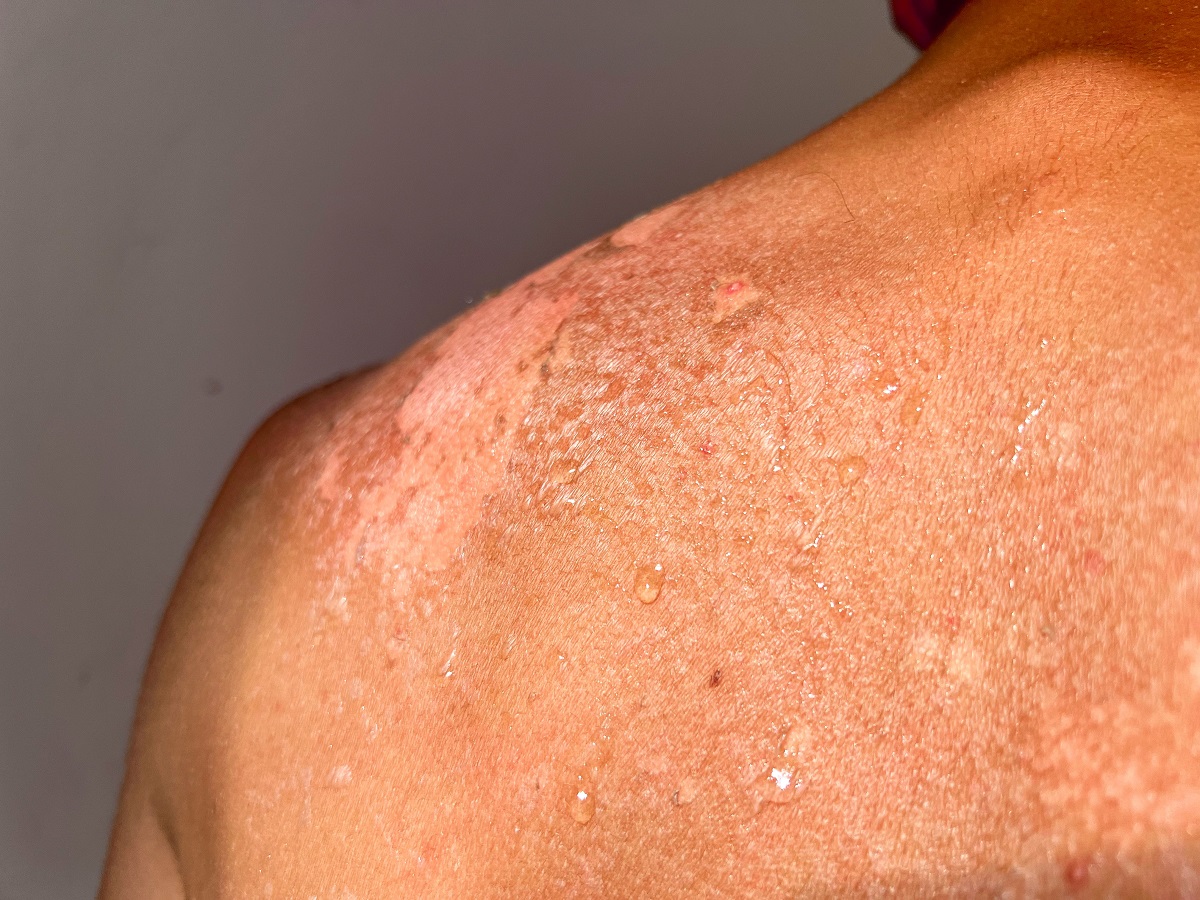A group of rare health conditions that involve tightening and hardening of the skin is called scleroderma or systemic sclerosis. This skin disease can provoke digestive tract, blood vessels, and internal organs issues.
In most cases, this skin condition is categorized as diffuse or limited but only shows the degree of skin involvement. In addition, morphea is a localized scleroderma that impacts the skin only.
Unfortunately, there is no way to cure this skin disease but with early diagnosis and proper treatment, you can slow down the progression, lessen the symptoms, and improve your quality of life.
Symptoms
People commonly experience different symptoms because it depends on the part of the body that is affected by this disease.
Skin-related Symptoms
Approximately all people with this skin disease experience hardening and tightening of the skin. Commonly, fingers, hands, feet, and face are the first body parts that are affected by this condition. Others can also experience thickening of the skin that involves upper arms, chest, abdomen, lower legs, thighs, and forearms. The most common symptoms include itchiness and swelling. Moreover, the skin can become lighter or darker because of tightness.
Furthermore, some people may also experience small red spots on the skin (known as telangiectasia) usually located on the hands and face. Bumps under the skin can occur in people with scleroderma due to calcium deposits under the skin.
Raynaud’s Phenomenon
This occurs commonly in people with scleroderma. Excessive contraction of the small blood vessels in the fingers and toes due to cold temperatures and emotional distress usually provoke Raynaud’s phenomenon. However, this phenomenon can also happen in people without scleroderma.
Digestive Symptoms
This condition can negatively affect any part of the digestive system from the esophagus to the rectum. Check below some symptoms:
- Bloating
- Constipation
- Fecal incontinence
- Swallowing problems
- Heartburn
- Diarrhea
Heart and Lung-related Symptoms
In case the scleroderma impacts the heart or lungs it may cause shortness of breath, reduced exercise tolerance, and dizziness. It also can lead to lung scarring but certain medicines can help to reduce lung damage.
Hypertension (high blood pressure) happens when scleroderma affects the heart. As a result, it may lead to excess fluid in the legs, feet, and around the heart (rarely). Moreover, if scleroderma impacts the heart, it can also cause irregular heartbeats, heart failure, and other problems.
Causes
This disease usually occurs due to an increased collagen production that builds up in the tissues. A fibrous type of protein that helps to connect the body’s tissues (including the skin) is known as collagen.
However, healthcare professionals do not understand why increased collagen production starts but the immune system may play a role. Probably it happens due to a combination of factors including genetics, immune system issues, and environmental factors.
Risk Factors
While anyone can experience this condition, women and people assigned to females at birth (AFAB) are more prone to get it. Commonly, it occurs between 30 and 50 years old. Check below some risk factors:
- Genetics – Those who have gene mutation are more likely to develop scleroderma.
- Environmental factors – As per studies, viruses, medications, or recreational drugs can trigger this condition. Continuously exposure to toxins and chemicals can also contribute to scleroderma. Unfortunately, most people cannot identify environmental triggers.
- Immune system disorders – Most experts consider scleroderma an autoimmune disease, which means the body’s defense (immune system) attacks its connective tissues. In addition, most people with scleroderma have symptoms similar to other autoimmune diseases including Sjogren syndrome, lupus, or rheumatoid arthritis.
Complications
If you do not treat this condition, you may experience some complications. These range from mild to severe. Examples include:
- Fingertips – In severe cases of scleroderma, blood flow is restricted and it may lead to permanent damage of the tissue at the fingertips.
- Lungs – This health condition can cause scarring of the lung tissue which leads to breathing problems. Pulmonary hypertension also can occur.
- Kidneys – Scleroderma renal crisis is another life-threatening complication and it involves sudden increased blood pressure and quick kidney failure. In such cases, it is very important to receive prompt treatment to maintain kidney function.
- Heart – This disease can also provoke scarring of the heart tissue which can lead to heart failure or irregular heartbeats.
- Teeth – The mouth can become smaller and narrower due to tightening of the facial skin. Therefore, brushing your teeth can be challenging. In addition, reduced saliva production also can occur in people with scleroderma and the risk of dental decay elevates even more.
- Digestive system – Usually, digestive complications include swallowing problems and heartburn. Diarrhea, bloating, bouts of cramps, and constipation also can occur.
- Joints – Tight skin over the joints can restrict flexibility and movement. However, it happens usually in the hands.
Diagnosis
Sometimes, it is difficult to diagnose this health condition because it can impact different body parts. However, usually a physical examination is enough to diagnose scleroderma. Additionally, healthcare providers may also order you to do some tests to identify what body part is affected. These include blood tests, imaging, or organ function tests. Previous tests help the doctor to see what part of your body is affected (such as the digestive system, heart, lungs, kidneys, or others).
Treatment
Unfortunately, there is no way to cure scleroderma or interrupt increased collagen production. In any case, early diagnosis and treatment can help you control symptoms and prevent scleroderma complications. Check below some treatment options:
Medications
Commonly, physicians prescribe different medicines for people with scleroderma because it negatively affects different parts of the body. For example:
- Blood pressure medications are used to widen blood vessels. These medicines are effective in Raynaud’s phenomenon treatment.
- Immunosuppressant drugs are also prescribed by doctors because they help to suppress the immune system, which helps to slow down scleroderma progression.
- Medicines are used to treat heartburn and relieve other digestive symptoms. Moreover, they can prescribe some antibiotics to help decrease bloating, diarrhea, and constipation.
- Healthcare providers may also prescribe medicines that help to prevent infections. They can also recommend vaccines used for influenza, pneumonia, shingles, HPV, COVID-19, and RSV.
- In case you experience persistent pain, doctors may give you some medications that help to relieve and control pain.
Therapies
Some therapies can help you to improve strength and mobility. For instance, hand therapy can reduce or prevent hand stiffness (also known as contractures).
Surgery
A surgery known as a stem cell transplant is usually prescribed by doctors for people with severe scleroderma symptoms and who do not respond to other treatment options. Organ transplants also can be recommended by physicians if lungs or kidneys are seriously damaged.
Home Remedies
The following remedies may help you to reduce the symptoms and improve your quality of life. For example:
- Regular exercise
- Get skin protection, especially when outdoors
- Quit smoking or never start
- Manage heartburn by avoiding trigger foods
- It is important to keep your body in warm temperatures because it helps to prevent Raynaud’s phenomenon
Frequently Asked Questions
What is the life expectancy of scleroderma?
The prognosis of an advanced form of this condition ranges between 3-15 years. However, some people experience minor symptoms and live a normal life.
Can scleroderma be cured?
Nowadays there is no treatment that can cure this disease. But with treatment, you can reduce the symptoms and improve the quality of life. If you suspect you have this condition, discuss it with your doctor.
What are the possible complications of scleroderma?
- Congestive heart failure
- Cardiovascular disease
- Pulmonary fibrosis
- Pulmonary hypertension
- Kidney failure and others
If scleroderma is not treated, any of the previous complications can occur. Ask your healthcare professional if you have any additional questions.




